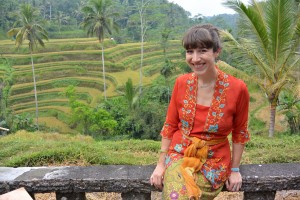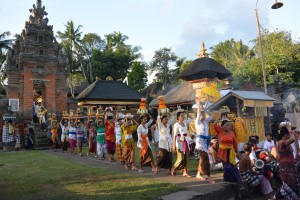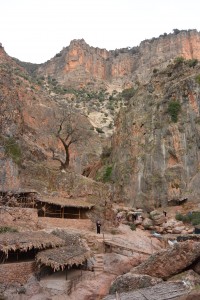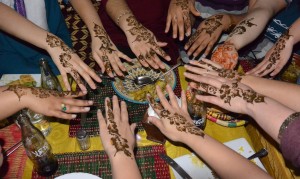
Jennifer in traditional Balinese kabaya top, sarong, and sash overlooking rice fields near the program’s outdoor classroom in Ubud, Bali.
Jennifer M. Pipitone spent a winter break in Morocco and half of a summer in Bali conducting field research on international education.
In her research, she argues that study abroad programs are not inherently educational nor do they intrinsically foster personal growth and cultural awareness; instead an appropriated international learning environment must be produced to impact the lives of students. Her dissertation embarks on an in-depth exploration and cross-case analysis of student experiences on two ethnically-diverse, short-term study abroad programs in Morocco and Bali. These particular programs are rooted in experiential education and designed to cater to a diverse community of students.

Kuningan Ceremony in a rural village outside of Ubud, Bali. Kuningan marks the last day of a festival where the ancestral spirits of the Balinese visit the earth, and marks the beginning and celebration of the harvest of rice. The festival cycles every 210 days. Our group was fortunate enough to witness trance at this ceremony once the sun went down. The syncopated rhythms of the gamelan orchestra that encouraged the able-bodied men carrying palanquins housing their gods into altered states of consciousness was a powerful cultural experience for students.
The overarching goal of her research is to understand the processes involved in the production of international experiential learning environments, document ethnically-diverse student experiences and group dynamics, and explore long-term impacts. She proposes an environmental framework to analyze the quality and landscapes of programs, and to understand the ways in which diverse students encounter each other and the ‘other’ and grow while abroad. She asks critical questions such as: How do different cultural geographies and landscapes impact student learning and growth? How can innovative, experiential pedagogical tools be used to promote cultural and environmental engagement and growth?

A visit to a rural Amazigh village nestled within the Middle Atlas Mountains near Fez in Morocco. As we walked through the village we encountered women baking bread in an oven made out of earth. Her kindness and generosity led us to break bread with her, prompting students to think about indigenous Moroccan cultures.
Through uncovering the production of international learning environments, and by acknowledging minority students’ international voices, Jennifer hopes her dissertation will contribute to the development of experiential pedagogies for constructing meaningful short-term study abroad programs that are attractive to, and meet the needs of, typically underrepresented students.
As an avid explorer of knowledge, cultures, and the outdoors, Jennifer’s current research reflects her passions for teaching, experiential education, and understanding the ways in which connection to surrounding environments can lead us down a path of discovery of the self and world.
In collaboration with her advisor, Jennifer is also exploring creative ways to engage students in the arts and the aesthetics of their environments as a means to promote cultural awareness locally as well as abroad. Jennifer’s pilot field research in Bali, funded in part by a grant received by her advisor from the Baruch-Rubin Museum of Art Project’s Integrating Arts Into the Curriculum Program, focused on integrating arts and aesthetics into the teaching of psychology abroad, which culminated in an “Engaging Students with the Arts Through the Teaching of Psychology in Bali: A Teaching Guide and Evaluative Codebook,” which is currently being adapted for publication.

The end of program celebration in Morocco was filled with traditional Moroccan art in the form of henna, food, and live music. Many were students were excited to return to the States with henna tattoos—a temporary symbolic imprint of the lasting impact of their cultural experience.
Jennifer was also recently featured in a Rewild Your Life Guidebook for her Master’s research on the production of therapeutic spaces wilderness on therapy programs–research that shaped her current work. Her contribution, “Creating Your Own Therapeutic Wilderness Space,” is aimed to help people connect with themselves through nature.
Please contact Jennifer directly at Jennifer.pipitone@gmail.com if you would like to review either of these documents or learn more about her research.
